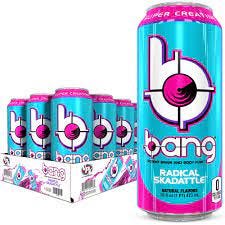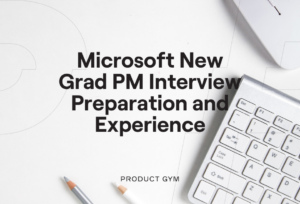This post was originally published on Medium.
If you can only read one PM interview article, read this one.
Four years ago when I decided even the big guy up there couldn’t stop me from becoming a product manager, there were virtually no resources out there for me. All my friends thought product managers were the people who checked inventory on aisle 7 for traffic cones in Home Depot. Now, times have certainly changed, but I thought I’d make your life easier by compiling shortlists to existing resources out there, along with a handy prep timeline.
Here’s the breakdown of this article:
- I’ll walk you through every single type of PM interview that exists.
- I’ll prescribe you a study plan depending on how much time you have to prep.
- I’ll provide a list of external resources, question banks, and prep communities you can join today. Like right now.

100% Guaranteed to be in your Interview
These sections are definitely gonna be in your interview, so if you only have time to cram a few things in your big brain you need to know this stuff. I’ve added a ⭐️ emoji for the resources you should focus on, and a ⏰ emoji for additional good reads — if you have time.
Behavioral Interview
What it is: Regardless of what job you apply for (in and out of tech) you’ll encounter the classic behavioral interview. Most of these questions will be scenario-based, pulling from a candidate’s past experiences to evaluate how you’ve navigated challenges and employed skills relevant to the position you’re interviewing for.
Why you need to know it: Behavioral interviews are designed to see whether you have enough relevant experience and context for the job. Especially in tech, if you can’t pull an example from a previous project or team you’ve worked on, it translates pretty clearly that you don’t have much working experience, which could be a prerequisite for the role.
Where you can learn more about it: You’ll notice some common themes and questions from the resources below, and the truth is, there’s only so many behavioral questions that exist out there. Most of these become pretty predictable once you run through enough, so practice, practice, practice.
You can’t go wrong following the STAR format for behavioral interviews: Situation, Task, Action, Result. I add an extra step, “I” (which stands for impact) because it’s more impressive when you can quantify the results of your actions. Ex: “This feature I launched ended up driving a 15% increase in sessions on our homepage.”
⏰ Arc Dev — 8 Behavioral Interview Questions asked by Top Tech Companies
⏰ Turing — Top Behavioral & Technical Question asked by Top Tech
⏰ Tech Interview Handbook — Behavioral Interviews for Software Engineers
Product Design Interview

What it is: How would you build a shopping experience for the blind? How would you improve AirPods? What’s your favorite non-software product? These are all examples of product design questions. Luckily, there are only 3 types of product design questions that exist. 1) Designing a new product 2) Improving an existing product 3) Breaking down your favorite product. Every other question will be an extension of these three. While you have to be much more realistic and consider technical limits IRL, design interviews are a chance to explore moonshots and show off your imagination.
Why you need to know it: The product design interview is so important because it’s the core of what product managers do: design, build, and improve products. Every step along the way reveals information on how you would perform as a PM. Did he ask clarifying questions? No? He doesn’t try to understand the problem fully before brainstorming a solution. Does she consider edge cases? Yes? She’s going to be a detailed and creative problem solver. This is an exercise you’ll run through every single day as a product manager on the job, so keep going until you can answer these questions in your sleep.
Where you can learn more about it:
⭐️ iGotanOffer — Product Design Questions
⭐️ Exponent — Design a Smart Shoe [VIDEO]
⭐️ Book — Cracking the PM Interview
⏰ Design Spotify for the blind.
⏰ Book — The Design of Everyday Things
Product Strategy Interview
What it is: Should Amazon enter the podcast market? What are three new initiatives Nike should look into to increase revenue? If you had to create a startup, would you choose the crypto or DeFi industry? These are all examples of product strategy questions, where you’ll be asked to adopt an executive mindset walk an interviewer through the direction you would take a product or company.
Why you need to know it: Product managers are thinking of new bets all the time. Being a top tech company means you have to keep up with all the trends, know your market very well, and identify any industry whitespace you can capture. You’ll need to be prepared to make executive decisions at all times, which means knowing the ins and outs of your product and its greater market.
Where you can learn more about it:
⭐️ Exponent — How to Answer Product Strategy Questions
⭐️ iGotanOffer — How to Crack Product Strategy Interview Questions
Metrics Interview
What it is: Let’s pretend you are the CEO of McDonald’s and you just added a new item called the Super Happy Meal to your menu offering. How will know if this Super Happy Meal is better than the Happy Meal? Well, one way you can test this is to track if more customers buy the Super Happy Meal than the Happy Meal. You can also ask each customer to rate the Super Happy Meal and the Happy Meal after purchase and see which meal averages a higher rating. # of purchased meals and average meal satisfaction score are both examples of metrics. A success metric is a criteria in which we specify how we define “success” for a product. Sample interview questions are “What metrics would you use to determine success for Facebook Sponsored Posts?” or “List the top three metrics Uber should caution if the company decides to rollout a rideshare for after-school pickups.”
Why you need to know it: My whole job revolves around this. Every day we’re considering which metrics we need to drive up, which ones can’t go down. Metrics (and collecting user data) are the only way to get a good read on whether a feature is doing well or not, so any product manager who is not metric-fluent will not be a useful PM.
Where you can learn more about it:
⭐️ iGotanOffer — How to Crack Metrics Qs in Product Manager Interviews
⏰ Product Management Exercises — Metrics Interview Questions
⏰ Hackernoon — 4 Steps to Defining great Metrics for any product
Possibly in your Interview (still good to know!)
These sections may or may not be (depending on company) in your interview, but it’s still good to prep for the following types of questions. Even if you don’t encounter these problems in your interview, your goal should be to evolve into the best, well-rounded PM you can be, so just learn it anyway to continue improving yourself and honing your craft.
Estimation Interview

What it is: No one actually cares if you know how many windows are on the Empire State Building, it’s all about the process you go about to solve questions like these. Can you logic through questions with a good product intuition? Can you draw from existing data to make accurate inferences? The Google APM program is famous for including estimation interviews in its final round for candidates, and mine consisted of estimating the number of contractors we needed to hire in X city for X product launch.
Why you need to know it: We actually use this skill a lot as PMs. You’ll be exercising the same estimation muscle when you forecast revenue growth for a feature launch, or predict the TAM (total addressable market) for a feature change.
Where you can learn more about it:
⭐️ iGotanOffer — PM Interview Estimation Q Walkthrough
⭐️ iGotanOffer — The Ultimate Guide to Market Sizing
⭐️ Book — Cracking the PM Interview
⏰ Impact Interview — Market Sizing & Estimation Qs
Technical Interview

What it is: If you didn’t get that joke, you’re not alone. While many companies have shifted away from coding assessments, certain companies like Salesforce’s APM program still screen candidates through Hackerrank challenges. The summer before I started prepping for PM interviews, I took a technical interview bootcamp that helped refresh some concepts and streamline the way I approached interview questions. There is an art to coding interviews — just because you did well in your intro to Python course doesn’t mean you understand how to optimize for solving Leetcode questions under pressuring time constraints.
Why you need to know it: You really don’t. This is the annoying part, but APM programs have gotten so competitive that recruiters look for candidates with technical backgrounds just to cut down the size of applicants. You rarely ever code on the job as a product manager, and while I can see the benefit of having been an ex-engineer, you can easily compensate by communicating well with your engineering manager/partner on the job.
Where you can learn more about it:
⭐️ Leetcode — Technical Interview Training Platform
⭐️ Hackerrank — World’s Top Technical Interviewing Platform
⭐️ TripleByte — How to pass a programming interview
⭐️ iGotAnOffer — How to Crack Technical Qs in PM Interviews
⏰ Better Explained — Sorting Algorithms
⏰ Visualgo — Visualizing data structures and algorithms through animation
⏰ ProductHQ — Empathizing with Engineers
System Design Interview

What it is: Just kidding, you don’t have to be an artist to ace the system design interview. The system design interview is different from the technical interview because there is zero coding involved. An example of a system design question is: “Design Reddit from a system design perspective.” “How would you create a new chatbot for pet caretakers?”
Why you need to know it: Can you break a system down to its individual components? Even though you won’t be building these systems on the job, being aware of how they work will give you enough context to facilitate productive conversations with your engineers. If you’re working for Instagram, it definitely helps to understand how to build a basic social media app. If you’re the product manager for Facebook Messenger, knowing how a messaging system caches data will put you at a significant advantage.
Where you can learn more about it:
⭐️ Educative — Grokking the System Design Interview
⭐️ Exponent — System Design Mock Interview [VIDEO]
⏰ Medium — How to Scale SQL vs. NoSQL Databases
⏰ Hackernoon — System Design Interview Checklist
⏰ Hackernoon — Fundamentals of System Design
⏰ Hackernoon — How to Ace to your next System Design Interview
⏰ Hackernoon — MVC vs. MVVM: How a website communicates with its data models
⏰ Soundarya’s Drive of Technical Interview Qs
1 year prep timeline
The early bird does indeed, catch the worm, and kudos to you if you’re getting a head start on your PM career. I didn’t even start this early. You can practice at a leisurely pace, spend time researching companies you want to work for, and network around to find aspiring PMs/mock interview partners that complement your style.

I find it easier to learn by running a diagnostic on my current interview strengths and then prioritizing what I need to learn from there. For example, I found out I was really good at system design and product design interviews, but noted that I was unconfident with estimation and product strategy interviews, so I dedicated most of my time earlier on to those two types of interviews.
- Month 1: Go through all the resources in this article, set up a mock interview for each interview type, figure out your strengths and weaknesses
- Month 2–3: Practice on your own/with a mock partner on one interview area of weakness (Ex: technical interviews) 1x a week
- Month 4–5: Practice on your own/with a mock partner on a different interview area of weakness (Ex: metrics interviews) 1x a week
- Month 6 (extra credit): Do a full-blown product improvement case study and add it to your portfolio (Behance is a good site)
- Month 7–8: Prioritize networking & coffee chatting other product managers, alumni, or recruiters at company of interest
- Month 9–10: Practice on your own/with a mock partner for the rest of the interview areas you feel are your strengths (Ex: product design and strategy interviews) 1x a week
- Month 11–12: Fill in any remaining gaps and schedule mock interview practice sessions 2x a week leading up to interviews
Good habits to pick up along the way:
- Spend every morning thinking through a product design/improvement question (Ex: “How can I improve this cup?” “How would I change the current YouTube experience so I can enjoy watching videos more?”)
- Schedule a coffee chat with another aspiring PM at least 2x a month (acts as an informal behavioral interview and gets you comfortable with talking AND you can meet new people)
- Enroll yourself in a technical interview bootcamp course to freshen up on common coding assessment challenges
3 month prep timeline
Most PM candidates start preparing the summer before recruiting season, so congrats, you’re on track. I recommend a slightly more aggressive prep schedule, just because you’ll probably have more time during the summer, and recruiting will soon become a priority. Again, I recommend doing an initial mock of all the interview types to figure out what your strengths and weaknesses are so you can be strategic about your preparation.
- Mondays: Knock out a product design question (regardless of weakness/strength)
- Tuesdays: Mock interview with a partner (area of weakness)
- Wednesdays: Spend 2 hours running through some interview problems (areas of strength)
- Thursdays: Mock interview with a partner (different area of weakness)
- Fridays: Coffee chat another product manager, recruiter, or alumni (and stay in touch regularly)
1 month prep timeline
Whether you are a bit crunched for time or just need a quick refresher course, this is how I would spend one month prepping for PM interviews.
- 1 day behavioral prep refresher
- 5 days product design prep
- 1 week prep on area of weakness #1
- 1 week prep on area of weakness #2
- Last week run through all types of PM interviews at least once
- [optional] 2 days for system design prep
- [optional] 2 days for estimation/sizing prep
- [optional] 1 week technical interview prep (Leetcode or Hackerrank)
1 week prep timeline
And for those of you who really like to live life on the edge, here’s how I would cram for my upcoming interviews — I hope you have some Bang Energy drinks nearby.

- Skip behavioral prep
- 3 days intensive product design prep (try to schedule in 3 mock interviews within these three days, one for each type of question: product creation, product improvement, favorite product)
- Spend 3 days of prep on your 2 biggest areas of weakness. Record yourself on Zoom and play it back to listen and watch how you answer these questions.
- Last day, just run through each type of interview once. Have your behavioral interview answers and why product/company narrative rehearsed. Make sure you sleep at least 8 hours before your interview (sleep > extra 2 hours of prep when it comes to execution)
- [optional] 1 day for system design/technical/estimation prep
Obviously, one week is not enough for extensive preparation. You’re competing against people who have been drilling questions and mock interviewing for months, so unless you’re the definition of charisma or you were a product manager in your past life, don’t expect to be raking in offers left and right. Preparation is half the battle, after all.
Now, an Endless List of Practice Resources
Question Bank
These might seem overwhelming, but the key is to tackle one a day. I built up a cadence where I would think through one question at breakfast every morning while I was chugging down my Cinnamon Toast Crunch. Through sheer exposure, you’ll begin to find patterns in questions, and in time, you’ll rarely find yourself caught off guard in an interview.
⏰ Lewis Lin’s PM Question Bank
⏰ Product School — The Ultimate List of Product Manager Interview Questions
⏰ The PM Interview — generates a new PM question for you every time
Great Interview Prep Communities
Running through questions in your head will NEVER compare to simulating an interview in real life. The nerves, the pressure, the thinking on your feet, the unexpected counter-questions — I owe my calm and collected demeanor to the hundreds of mock interviews I conducted over the past 4 years. Practicing with other people is the best way to get more natural at these interviews, and it’s honestly super fun to meet other aspiring PMs. I actually became really good friends with my mock interview partners, and even after landing my job we still lean on each other for advice. Here are good places to find your new support system:
⭐️ Lewis C. Lin’s Interview Prep Slack Channel
⭐️ Product Buds
⭐️ Nova (formerly known as Ladder)
Other great general resources
⭐️ Product School — Product Glossary (your dictionary to decoding product jargon)
⭐️ The APM List — Keep track of which companies are hiring for APMs
⏰ Exponent — How to choose the right APM program for you
⏰ Exponent — A Checklist For The Perfect Product Management Resume
⏰ Hackernoon — Mention these five tech trends in your PM
⏰ Hackernoon — The Perfect Structure for Every Product Management Interview Question
⏰ The Take-Home Challenge that got me a PM job at Uber
Now that you’re equipped with this survival kit, it’s time to venture off into the wilderness (of scary interviews, at least). It’s a good idea to save this article so that you can reference it anytime, because it’s a lot of info to digest, and you’ll probably need to click back to these resource links. Please share this article with a struggling PM friend as well 😀 I’m working on releasing sample mock interview videos for each type of interview question covered above, so stay tuned.
Good *job* hunting!



